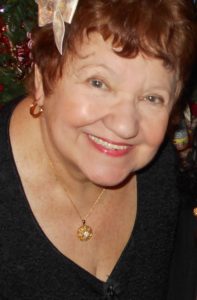 As a new writer, you may be wondering why an editor is important and why you need one, especially if you are proficient at grammar. This interview features one of the top editors in the field, Fontaine Wallace. She has been Michele Campanelli’s editor since she started her writing career in the early 90s. Fontaine Wallace is now a retired English Professor of Communication from the Florida Institute of Technology and has taught students for over forty years. Fontaine has spent her life ensuring that English is appreciated and cherished by all.
As a new writer, you may be wondering why an editor is important and why you need one, especially if you are proficient at grammar. This interview features one of the top editors in the field, Fontaine Wallace. She has been Michele Campanelli’s editor since she started her writing career in the early 90s. Fontaine Wallace is now a retired English Professor of Communication from the Florida Institute of Technology and has taught students for over forty years. Fontaine has spent her life ensuring that English is appreciated and cherished by all.
What are common misconceptions people have about book editors?
Fontaine: I think some people may have the mistaken notion that editors strictly look at grammar. Editing does include grammar; that’s true. But it also involves asking questions such as is this clear to the reader? Have you made the scene come alive? Have you included enough description? How is the dialogue? Is the story coherent? Was the ending abrupt? Did you foresee it? Is there foreshadowing? Are all the characters identified?
What is the most challenging aspect of editing?
Fontaine: Not to murder a writer and try to offer positive feedback. I like the sandwich approach, which provides praise, helpful criticism, and then additional praise. This approach allows you to provide feedback that can be improved on and protects the writer’s feelings.
Do you think it is important for an editor to get along with an author?
Fontaine: It is absolutely necessary to have mutual respect for each other.
Tips for picking an editor?
Fontaine: Find an editor that has a good rapport with you. Not necessarily one who praises you to the sky. The reason you hire an editor is to improve your work. Be willing to accept a little criticism; don’t take feedback personally. The editor is looking at your work, not you as a person. The editor should be able to give you critical suggestions. Without definitive improvement suggestions, the editor is not helping you.
What would you say to writers who feel their editing skills are proficient enough not to require an editor?
Fontaine: I think everybody needs an editor. We all think we have it right on paper. One of the things that an editor has to be aware of is the absence of something. Maybe it’s the absence of the kind of setting. Think of Avatar, how could you appreciate that story if you didn’t understand the setting? The type of writing you do changes what needs the most editing.
When should a writer hire an editor, at the beginning or completion of a manuscript?
Fontaine: I always prefer to look at the manuscript after completion. However, there are some editors who prefer to review from the beginning and work chapter by chapter. It also depends on how much help is needed. Some editors will work as ghostwriters, but they will require more time and more compensation.
How are editors paid?
Fontaine: Some editors are paid per word, per chapter, after publication, or given a certain percentage of the residual. Make sure you agree on the terms. I suggest you sign a contract.
Typically, how long is the editing process?
Fontaine: It depends on the work itself and how well it’s written. If initially it’s well written, the work might not require much editing at all. When I worked in the learning center, some people came in as good writers and didn’t need much direction. So, it entails on what’s brought in, and what the original is. If the original needs a lot of work, it’s going to take more than one review. I would say at least two or three reviews. But everybody comes to writing with a different idea. So, you have to make sure that people who write know what they want to say, and they don’t always get that on paper; between the head and the hand, it could be a mile apart.
Who are your favorite authors?
Fontaine: I love Nora Roberts, William Shakespeare, Robert Frost, Dylan Thomas, James Patterson, Emily Dickinson, and Dick Francis. Dick Francis often writes about horse racing and makes it thrilling. That is often proof of an intriguing writer, one who can take a subject for which the reader has no inclination but capture his/her interest.
How is editing helpful in getting published?
Fontaine: Sending in an error-ridden manuscript shows carelessness and affects if it will be seriously considered by a publisher or agent. Some might trash it immediately. A well-edited manuscript, article, short story, or blog is much more likely to get published!
What skills do you think a good editor should possess?
Fontaine: Excellent grasp of mechanics and patience when working with someone who may not know all the grammar rules are required. Also, a vivid imagination helps the editor visualize the action presented.
What elements define a good piece of writing?
Fontaine: An essential element is clarity; are you getting your story across? Credibility is another, is your story believable? You have to describe the scene so the reader can imagine it adequately. Some people are very imaginative, and other people aren’t. So, what you write is determined by your audience. Also, how much you write and how you present it involves the audience. So, you have to be aware of who your audience is. Once you find your niche, I would suggest that you study that genre. If it’s scientific, read a lot of scientific journals. If it’s a horror, read a lot of horror. Studying your chosen genre helps you understand the market.
What grammar errors do you see the most?
Fontaine: Most commonly seen are misspellings, comma splices, and shifts in tenses and person.
Are there any good books that will help an author with grammar or editing?
Fontaine: I recommend college grammar handbooks for reference. I also believe every good writer should read the classics and study the most famous works in his/her genre.
How can new writers get involved in a trustworthy writing community?
Fontaine: Search the internet or local newspaper for writing clubs. If you join writing clubs, you’ll be in touch with other writers who will read your work. This allows you to make connections; it’s good to have connections. If someone is in a rural area, there might not be local writing clubs, but there are groups online. You could start coursework; sometimes, coursework allows you to make connections. You want to connect with people who are helpful and want to help you. If they don’t have that attitude, they’re not going to help you much. Also, you don’t want 100% condemnation. You want some criticism and some praise. It takes someone who’s willing to be objective to see that there are good things about your writing and perhaps things that need addressing. You might make a connection that isn’t the right person for you. It’s living and learning— trial and error.
Any advice for new authors?
Fontaine: 1) Utilize the Writer’s Market. 2) Read strong authors, especially in your chosen genre. 3) Proofread your work for grammar errors, for misspellings, for shifts in tense and person. 4) Read your work aloud to check for coherence, conciseness, and consistency. 5) Aim to get feedback from peers. 6) Include some sensory descriptions to enliven your prose and to help readers visualize the scene. 7) Hire a hardworking, proficient editor, so your manuscript will be seriously considered. 8) Rewrite if necessary. Usually the more drafts you complete, the better the finished product. 9) Just start writing!




